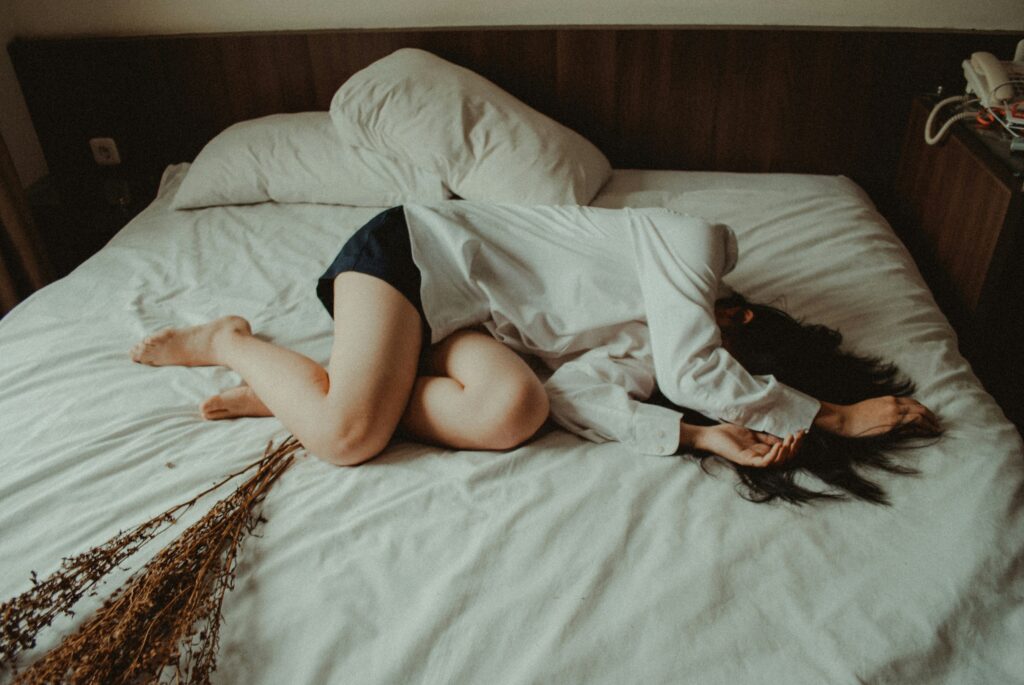For many, the mental health and emotional impact of menopause is the most profound. The effects on mental health can be life-changing and, for some, life-threatening. Low mood, anxiety, low self-esteem, irritability, and rage are unfortunately all very common. Understanding the connection between menopause and mental health, and knowing where to find support, is essential.
Mental Health in Menopause

Anyone can experience changes in their mental health at menopause. In most consultations, I hear from women who are losing confidence in their abilities at work, doubting themselves. Many are experiencing anxiety while driving on the motorway, or new social anxiety that means they withdraw from friends and activities that previously have topped them up.
Some women are particularly vulnerable to mental health challenges at menopause. If we have experienced depression, PMDD, or postnatal depression, we are more likely to experience low mood at menopause.
Menopause can also stir up old trauma; it’s not uncommon to notice memories or emotions re-emerging at this time.
Neurodiverse women may find themselves “unmasked” by menopause and plunged into conflicting emotions of grief and relief.
It’s a time of flux for our nervous system. Our mind and body are changing; it can feel like we’re not in control. It’s a time of life where we’re often pulled in so many different directions, and any vulnerabilities we have frequently make themselves known. For many of us, our biggest vulnerability is the level of stress we’re under every day.
Many women at menopause are also juggling care for parents and children, all while managing their own careers and running the household. This can fuel burnout, anxiety, and low mood.
Lifestyle Approaches That Support Mental Health

- Sleep: Disturbed sleep affects most people at menopause and deeply impacts mood. Sleep hygiene measures with morning and evening routines, a cool dark bedroom, and cutting back on caffeine can all help. As can HRT, magnesium, CBT-i, weighted blankets, lavender pillow sprays, and relaxation strategies.
- Nutrition: Balanced meals rich in plants, with fibre and microbiome support, and limited ultra-processed foods can reduce inflammation and support anxiety and low mood.
- Alcohol: Alcohol can worsen sleep disruption, anxiety, and low mood. Even small reductions can have a major impact.
- Movement: Regular movement, whether walking, yoga, or strength training, improves mood, reduces anxiety, and supports emotional health. Some people find cold water swimming to be particularly effective for their mental health.
- Rest: True rest isn’t just sleep. It’s also allowing yourself downtime without guilt. Meditation, journaling, or simply doing nothing has restorative power.
- Connection: Isolation can intensify low mood and anxiety. Staying connected with friends, family, or others experiencing menopause helps create a sense of belonging and shared understanding. Singing in a choir can be particularly uplifting for some.
- Psychological support: Therapy, support groups, and coaching can help us navigate identity shifts, grief, and the new roles that often accompany menopause, so we are ready to embrace our second spring.
Medication Options
Lifestyle changes are powerful, and sometimes additional treatment helps too:
- HRT (Hormone Replacement Therapy): Can relieve both physical and mental health symptoms. If we have a history of PMDD or postnatal depression, the right progestogen is often key.
- SSRIs (Selective Serotonin Reuptake Inhibitors): These antidepressants can be used to treat anxiety and low mood in menopause, alone or with HRT.
If you or someone you know is feeling hopeless or overwhelmed, please seek professional support immediately. You are not alone. You can call 111 and select the mental health option, 24/7, and be put through to someone who will understand and help you with the next steps.

Final Thoughts
Menopause is a whole-person experience. It’s normal for there to be real highs and lows, but if you’re struggling, know that support exists. From lifestyle shifts to medication, from therapy to community, you don’t have to walk this path alone. Here at Rethink, I offer personalised, holistic consultations with follow-up to support you, whatever your experience.
Useful resources
Insight Timer is a free app with guided meditations and breathwork
BACP has a list of registered therapists here.
The Sleep charity has lots of practical tips on their website
Zoe podcast Food and mood
